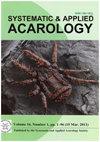花粉是两种多面手掠食性螨的唯一食物来源(蜱螨目:植物绥螨科)
IF 1.2
3区 农林科学
Q2 ENTOMOLOGY
引用次数: 0
摘要
大钝绥螨和花斑恙螨(蜱螨亚纲:植物绥螨科)是一种常见的掠食性螨,自然栖息在椰子种植园和其他热带作物中。评估了两种椰子害虫螨的适宜性:印度革螨(革螨螨)和印度革螨(革螨螨);贮藏螨腐乳螨(蜱螨亚纲:蜱螨科);蜂蜜;蓖麻、蓖麻、香蒲及其混合物的花粉,可作为大量饲养大叶蝉和斑叶蝉的食物来源。单独或混合提供的两种花粉均能使大叶杉和斑叶杉产生最高的后代产量,因此被选择用于进一步的生命表研究。不同的花粉食材对大白桦尺蠖的存活率没有影响,而混合花粉食材对大白桦尺蠖的存活率高于单独食材对大白桦尺蠖的存活率。不论花粉摄取量如何,大叶蝉和绿斑田鼠的产卵率均在成虫初期达到最大值。总体而言,生命表参数表明,以大白杨为食的白杨花粉和以花斑田鼠为食的混合白杨花粉在种群生长和繁殖方面效果最好。综上所述,在单独取食和混合取食花粉的情况下,大叶蝉和大叶蝉都能很好地生存和繁殖。此外,这些结果表明花粉补充在提高这些捕食者的保护生物控制效率方面具有潜力。本文章由计算机程序翻译,如有差异,请以英文原文为准。
Pollen as sole food source for two generalist predatory mite species (Acari: Phytoseiidae)
Amblyseius largoensis and Typhlodromus ornatus (Acari: Phytoseiidae) are generalist predatory mites that naturally inhabit coconut plantations and other tropical crops. We assessed the suitability of two coconut pest mites, Raoiella indica (Acari: Tenuipalpidae) and Aceria guerreronis (Acari: Eriophyidae); the storage mite Tyrophagus putrescentiae (Acari: Acaridae); honey; and the pollens of castor bean, Ricinus communis, and cattail, Typha domingensis, and their mixture, as food sources for the mass rearing of A. largoensis and T. ornatus. Both pollens, supplied singly or mixed, generated the highest progeny production by both A. largoensis and T. ornatus, and were therefore selected for further life table studies. The pollen diets did not influence the survival of A. largoensis whereas there was higher survivorship of T. ornatus fed on the mixed pollen diet than on R. communis pollen alone. The maximum oviposition rate of both A. largoensis and T. ornatus occurred at the beginning of adulthood, irrespective of the pollen diet. Overall, the life table parameters indicated that the pollen of R. communis for A. largoensis, and R. communis with the mixed pollen diet for T. ornatus, were the best regarding population growth and reproduction. Collectively, our results indicate that A. largoensis and T. ornatus can survive and reproduce excellently when fed solely on R. communis or on the mixed pollen diet. In addition, these results point to the potential of pollen supplementation for the enhancement of the efficiency of these predators in conservation biological control.
求助全文
通过发布文献求助,成功后即可免费获取论文全文。
去求助
来源期刊

Systematic and Applied Acarology
ENTOMOLOGY-
CiteScore
2.20
自引率
33.30%
发文量
152
期刊介绍:
Systematic and Applied Acarology (SAA) is an international journal of the Systematic and Applied Acarology Society (SAAS). The journal is intended as a publication outlet for all acarologists in the world.
There is no page charge for publishing in SAA. If the authors have funds to publish, they can pay US$20 per page to enable their papers published for open access.
SAA publishes papers reporting results of original research on any aspects of mites and ticks. Due to the recent increase in submissions, SAA editors will be more selective in manuscript evaluation: (1) encouraging more high quality non-taxonomic papers to address the balance between taxonomic and non-taxonomic papers, and (2) discouraging single species description (see new special issues for single new species description) while giving priority to high quality systematic papers on comparative treatments and revisions of multiple taxa. In addition to review papers and research articles (over 4 printed pages), we welcome short correspondence (up to 4 printed pages) for condensed version of short papers, comments on other papers, data papers (with one table or figure) and short reviews or opinion pieces. The correspondence format will save space by omitting the abstract, key words, and major headings such as Introduction.
 求助内容:
求助内容: 应助结果提醒方式:
应助结果提醒方式:


